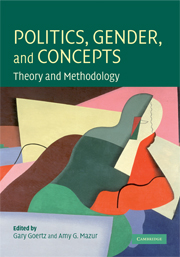Book contents
2 - Mapping gender and politics concepts: ten guidelines
Published online by Cambridge University Press: 06 July 2010
Summary
Concepts play a variety of roles in the research enterprise; they appear in scope conditions, case selection, contextual, independent, and dependent variables. Systematic data collection typically involves multiple concepts; what data are collected, the units and the scope of the data. The validity and usefulness of much research thus rest on the solidity of its conceptual foundations. Concepts are ultimately important because without them we would have empty theories and causal explanations. Concept analysis, (de)construction, and usage are of special importance to gender and politics scholars. Many gender research projects begin by attacking the “taken-for-granted” character of key social science relationships. This often involves bringing out the gender bias built into – but hidden – in the core of concepts. In this way much gender research is foundational in character: it explores the basic gender biases embedded in widely used concepts of political analysis.
While feminist scholars have continually engaged in concept criticism, concept reformulation, and concept creation, there has been no attempt, that we are aware of, to synthesize a set of methodologies for such endeavors. This chapter, and the volume as a whole, present a set of coherent guidelines for dealing with concepts.
More generally, courses on quantitative methods and research design based on statistical principles often devote little or no attention to the methodology of concepts. While sections devoted to measurement are common, there is rarely much on concept methodology.
- Type
- Chapter
- Information
- Politics, Gender, and ConceptsTheory and Methodology, pp. 14 - 44Publisher: Cambridge University PressPrint publication year: 2008
- 10
- Cited by

